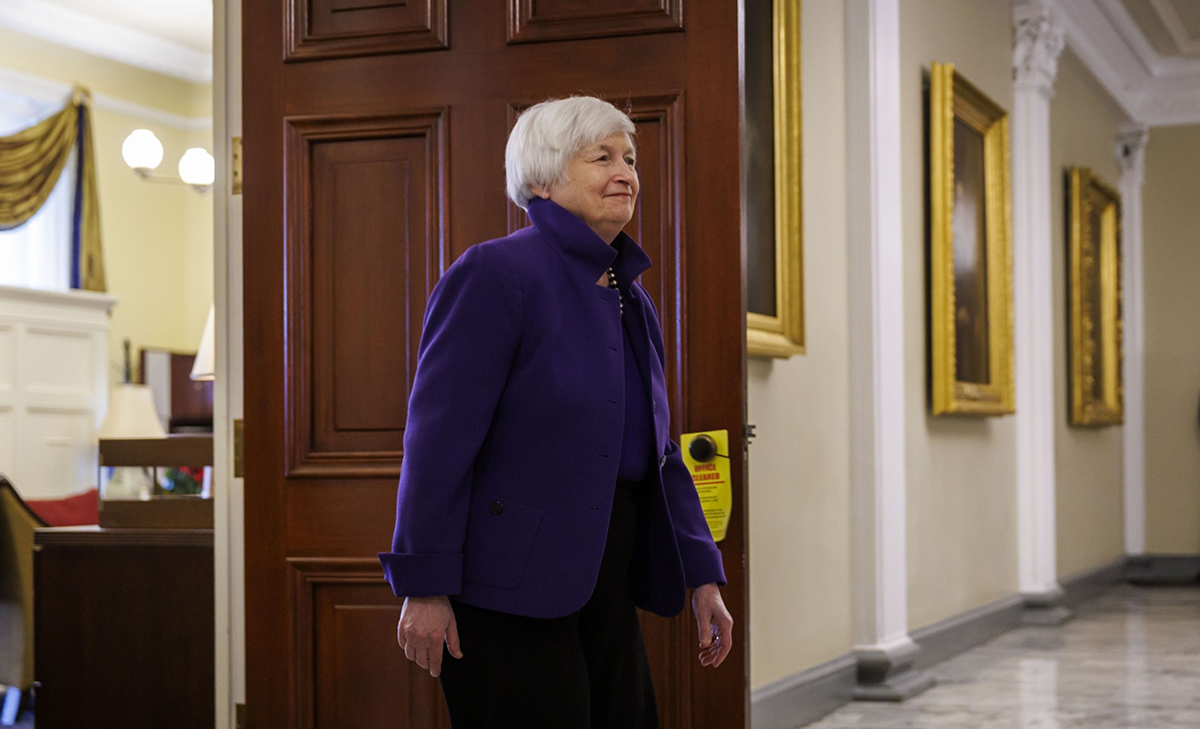 Janet Yellen at the U.S. Treasury Department in Washington, D.C., on January 10.
Janet Yellen at the U.S. Treasury Department in Washington, D.C., on January 10.
U.S. Treasury Secretary Janet Yellen said persistently weak inflation is likely to return as a long-term challenge for the economy and policymakers once the pandemic-era distortions that have driven the recent price surge subside and prices cool.
"We're just coming through an unusual and difficult period, but I do not think we're in any way back to the '80s and '70s," she said in an interview, referring to an era of rising prices and wages.
Recommended For You
Central banks still have a long way to go to smother the worst bout of inflation in decades. Still, with prices on the down trend, the debate is now shifting to what happens after this fight is over.
The risks of getting it wrong are high, economically and politically. Yellen, along with Federal Reserve Chair Jerome Powell and many in the U.S. economic establishment, incorrectly predicted in 2021 that the burst of inflation would be "transitory."
She has since admitted getting that call wrong and supported the Fed's efforts to rein in prices with aggressive interest rate hikes, which risk pushing the U.S. into a recession.
Unlike in the 1970s and early 1980s, Yellen said, the current episode of high inflation hasn't triggered a wage-price spiral, a dynamic in which workers demand raises in anticipation of higher prices, prompting firms to increase prices. Economists look for signs of such a spiral in inflation expectations.
"Expectations have been well-anchored, and I believe they're still pretty well-anchored," she said in the interview on Friday in Johannesburg, on the final leg of a three-nation visit to Africa. "So we're not seeing a wage-price spiral. That's not happening."
The annual increase in the consumer price index topped out at 9.1 percent in June, but has slowed to 6.5 percent as of last month in response to the Fed's rate hikes, easing supply-chain stresses, and sliding oil prices.
Former Treasury Secretary Lawrence Summers and Kenneth Rogoff, an ex-chief economist for the International Monetary Fund (IMF), are among those who have warned that the world's economy is entering a period of geopolitical tensions and debt crises, which will risk making episodes of high inflation and high interest rates more common.
Another former IMF chief economist, Olivier Blanchard, is more aligned with Yellen, arguing that today's inflation will not last and that central banks, including the Federal Reserve, will face a return to an environment where interest rates are uncomfortably close to zero. He's proposed that central banks counter that possibility by lifting their inflation targets from 2 percent to 3 percent.

Yellen spent a quarter century at the Fed, including four years as chair from 2014 to 2018. During almost that entire tenure, inflation was historically low thanks to demographics, technology, and globalization.
The Fed's preferred gauge of inflation, the personal consumption expenditures (PCE) index, rose by an annual average of 1.9 percent—below the Fed's current target—from 1992 to 2019. Many policymakers have worried that was actually too low, forcing interest rates close to zero and robbing the central bank of the ability to fight recessions with deep rate cuts.
The streak was shattered by Covid-19, marked by supply-chain disruptions and government aid that jacked up demand in the U.S., and then Russia's invasion of Ukraine early last year triggered a spike in energy and food prices. Such jumps since the mid-1980s have tended not to last, she said.
"The pandemic created such unusual disruptions in the economy," she said. "There were just a lot of supply-chain problems. We really hit the wall in a bunch of different sectors, and prices really skyrocketed."
Yellen didn't say how long she thought it would take for inflation to return to target, nor did she comment on how the Fed should react if it did.
—With assistance from Reade Pickert.
© Touchpoint Markets, All Rights Reserved. Request academic re-use from www.copyright.com. All other uses, submit a request to [email protected]. For more inforrmation visit Asset & Logo Licensing.



